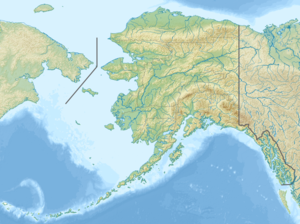| Melozitna River | |
|---|---|
 | |
| Location | |
| Country | United States |
| State | Alaska |
| Census Area | Yukon–Koyukuk |
| Physical characteristics | |
| Source | Ray Mountains |
| • coordinates | 66°02′43″N 152°46′02″W / 66.04528°N 152.76722°W / 66.04528; -152.76722 |
| • elevation | 1,529 ft (466 m) |
| Mouth | Yukon River |
| • location | 2 miles (3 km) northeast of Ruby |
| • coordinates | 64°45′47″N 155°27′29″W / 64.76306°N 155.45806°W / 64.76306; -155.45806 |
| • elevation | 157 ft (48 m) |
| Length | 135 mi (217 km) |
The Melozitna River is a 135-mile (217 km) tributary of the Yukon River in the U.S. state of Alaska. It flows generally southwest from the Ray Mountains to its mouth near the city of Ruby.
Boating
It is possible to run the Melozitna in many kinds of non-motorized boats. Most of the river is slow-moving and meandering, rated Class I (easy) on the International Scale of River Difficulty. The exception occurs in the 10-mile (16 km) Melozitna Canyon on the lower river, where a 4-mile (6 km) series of rapids may require portaging. This part of the river is rated Class II (medium) to Class IV (very difficult).
Dangers include high populations of grizzly bears along the middle reaches of the river and black bears along the lower reaches. The canyon portage can be difficult.
Melozitna Hot Springs
Melozitna Hot Springs or Melozi Hot Springs is a mineral hot spring destination located on a tributary of the Melozitna River, known as the Big Melozi. The hot springs is located about 10 miles from the main river. The hot springs are about 16 miles north of the Yukon River 30 miles below Tanana. Melozi Hot Springs is in the course of Hot Springs Creek, 3.5 miles E of its mouth, 26 mi. NNW of Hochandochtia Mtn., Kokrine-Hodzana High.; 65"54'30" N, 154"50'30" W. The local name was reported by the USGS in 1954.
History
A two-room cabin and a dog house were built on the gravel bank near the springs. Two small log bathhouses, possibly built earlier on each side of the springs, had wooden tubs and sweat chambers and were in operation in 1911. The bathhouses were used in winter by both whites and natives but less in the summer due to having difficult summer trails. The analysis of the water in 1915 showed clear dark water similar to black sulfur waters. In 1915, the Kokrines supported the Hub Roadhouse, a small trading point and post office on the north side of the Yukon River. The distance from there was about 16 miles.
See also
References
- ^ "Melozitna River". Geographic Names Information System. United States Geological Survey. January 1, 2000. Retrieved October 18, 2013.
- Derived by entering source coordinates in Google Earth.
- ^ Orth, Donald J.; United States Geological Survey (1971) . Dictionary of Alaska Place Names: Geological Survey Professional Paper 567 (PDF). United States Government Printing Office. p. 633. Archived from the original (PDF) on October 17, 2013. Retrieved October 11, 2013.
- ^ Jettmar, Karen (2008) . The Alaska River Guide: Canoeing, Kayaking, and Rafting in the Last Frontier (3rd ed.). Birmingham, Alabama: Menasha Ridge Press. pp. 124–25. ISBN 978-0-89732-957-6.
- Waring, Gerald A. (1917). Mineral Springs of Alaska 64. Washington: Government Printing Office.
- Orth, Donald J. (1967). Dictionary of Alaska Place Names, Geological Survey, Professional Paper 663. Washington United States Government Printing Office.
- Waring, Gerald A. (1917). Mineral Springs of Alaska 66. Washington: Government Printing Office.
This article about a location in the Yukon-Koyukuk Census Area, Alaska is a stub. You can help Misplaced Pages by expanding it. |
This article related to a river in Alaska is a stub. You can help Misplaced Pages by expanding it. |